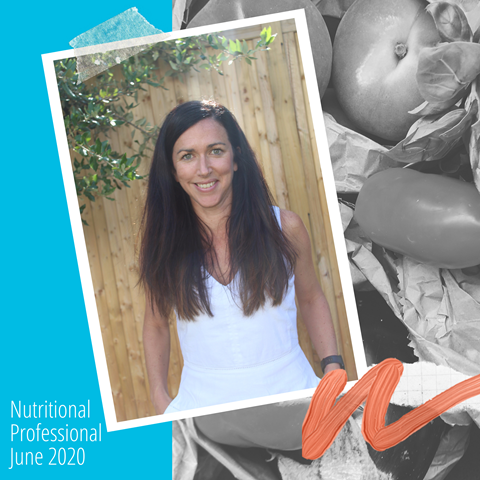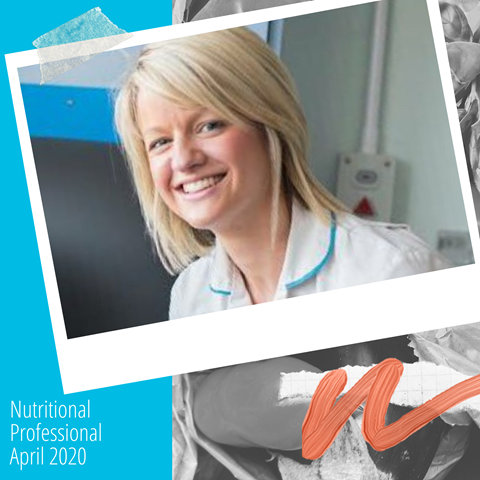Rebecca Gasche is a specialist gastroenterology dietitian with 7 years experience. She currently works as gastro/surgical clinical lead at the Countess of Chester Hospital after successfully training to become a supplementary prescriber.
Hi Rebecca, thanks for joining us today! Could you tell us a bit about yourself?
Hi Nualtra, thanks very much for having me! I am a gastroenterology dietitian, currently working as gastro/surgical clinical lead at the Countess of Chester Hospital. I’m originally from Devon, but moved ‘up north’ to study Nutrition and Dietetics BSc in 2009 at the University of Chester. I now reside in North Wales and enjoy the hikes and mountain bike trails Snowdonia has to offer, usually accompanied by my child (who has 4 legs, fur and a waggy tail).
Where does your interest in nutrition and dietetics stem from?
I have always had an interest in health, nutrition and food/cooking. Throughout school my interest continued and I also recognised a passion for helping people, which lead to me considering positions within the healthcare system. Realising there was a career within healthcare that involved nutrition seemed like the perfect route for me, and I was right!
What was your first dietetic job post-graduation?
My first post was a rotational acute dietitian at Royal Lancaster Infirmary, where I also had my C (P3) placement. I started in 2013 and spent two and a half years gaining a wide variety of experiences from different wards, clinics and patient groups.
What’s been your career journey since then?
In 2016 I moved back to Chester for my first specialist role, which was within the community team for the Countess of Chester NHS Trust. This post started as a developmental role, with my main task to set up a dietitian-led IBS service for West Cheshire. The success of this lead to my job becoming solely a gastroenterology dietitian and more recently this has progressed into gastro/surgical clinical lead, following on from my completion of the supplementary prescribing course. In addition to this I am a guest lecturer at the University of Chester for nutrition and dietetic students, write freelance articles for Network Health Digest magazine and have been a speaker at the BDA Gastroenterology Study day.
What does your role as Lead Gastro Dietitian at the Countess of Chester hospital involve?
My role involves overseeing the gastroenterology and surgical clinics and wards – this includes the clinical work that is undertaken and updating policies and procedures to support this. I support the team who have both presences on the wards and in outpatient clinics, as well as conducting my own clinics. I work closely with the gastroenterology team within the hospital as well as the Clinical Commissioning Group (CCG) in Primary care, attending MDTs with the wider gastroenterology team and meetings with GPs/CCG leads to support the pathways and patient journeys in both the Primary and Secondary care setting.
What sorts of gastro conditions/disorders do you commonly work with in your role?
The largest patient groups in the service are those with irritable bowel syndrome (IBS) or coeliac disease, and these patients are seen in our two dietitian-led services. Other patients seen in outpatient clinics or at ward level include those with inflammatory bowel disease (IBD), liver cirrhosis or those requiring a liver transplant, gastroparesis, pancreatitis (acute or chronic) and other bowel disorders such as diverticulitis and chronic constipation. From a surgical side of things, our main focus is managing patients with a high output ileostomies, but also we also see patients with colostomies, stoma reversals or bowel resections. At ward level this often involves managing patients on total parenteral or enteral nutrition.
What led to you undertaking supplementary prescribing training?
I am fortunate to have a supportive manager who had also undertaken the course and saw the potential impact it could have on the gastro/surgical service. We were able to plan how a non-medical prescribing (NMP) dietitian could be placed in the service to not only support patients but to also help prevent unnecessary referrals on to consultants (this fits in particularly well with the work I had already done in the IBS service) and cost-save. As a result we were able to secure funding for this.
Could you explain what supplementary prescribing training is and what it involves?
Non-medical prescribing allows nurses and other health care professionals to prescribe medications to their patients. There are currently two types of prescribers: an independent prescriber and a supplementary prescriber. An independent prescriber is a healthcare professional who is responsible and accountable for the assessment of patients and can make prescribing decisions to manage the clinical condition of the patient. A supplementary prescriber is a healthcare professional who prescribes within an agreed patient specific clinical management plan (CMP), which is agreed in partnership by a supplementary prescriber, a doctor and the patient.
The course itself tests knowledge through a ‘portfolio’ of academic writing, 3 written exams and an objective structured clinical examination (OSCE). You also need to gain 90 hours of ‘clinical practice’ – shadowing independent prescribers and completing certain tasks. The pass rates for the exams are high – 100% needed in a maths exam, and 80% in 2 pharmacology exams and the OSCE.
My course started in October 2019, with weekly lectures in University running until Christmas break. After Christmas came the mock OSCE, the ‘real’ OSCE, exams and lastly the deadline for the written piece and clinical hours document in February 2020. You could choose to do the course at either level 6 or level 7 – the differences between the two being level 7 have a higher word count in the written work and additional questions to answer in the OSCE.
What was the application process like to get onto the course?
The application involved a pretty lengthy document to be completed by myself, my manager, the trusts prescribing lead and my designated medical practitioner (DMP). The DMP’s role is to support you throughout the course to help you meet your competencies, have regular meetings with and complete relevant documentation – in my case my DMP was one of the gastroenterology consultants. Along with the application I completed a SNAP assessment – this is a maths test to show that you can complete drug calculations accurately (similar to what our nursing colleagues complete for their qualifications). And, of course, I had to get the study leave time approved by my trust.
Where did you study and how did this fit in around your job?
I attended the University of Chester for my supplementary prescribing training, which is a 40 credit course. Having the support from the team was essential prior to starting the course, as I had to reduce a lot of my clinical commitments to enable me to attend University, gain the clinical hours and revise!
What additional roles and responsibilities do you have as a supplementary prescriber?
Although with being a supplementary prescriber you are some-what supported by the CMP, you are still able to prescribe and alter medications for patients, which of course carries a huge responsibility. You really do need (and gain from the course) an in depth understanding of the pharmacological science and effects medications have. Gaining detailed clinical, medication and allergy history is vital.
Could you give some examples of how you can use your new supplementary prescribing skills in your clinical role as a gastro dietitian?
The 3 main areas I am focusing on using the qualification are for patients with high output ileostomies, IBS and diseases of the pancreas. Patients with high output ileostomies often need medications alongside dietary advice to control their stoma losses, prevent dehydration and correct deficiencies. For patients with IBS who do not respond to first line lifestyle changes and low FODMAP dietary advice, medications may be used to manage symptoms. And lastly for patients with certain diseases of the pancreas, the prescribing of pancreatic enzyme replacement therapy (PERT) is required.
What were some of the biggest challenges you faced whilst completing this training?
The amount of work needed in a short space of time! It was also a huge learning curve, having not picked up a pharmacology book for around 10 years and never having studied it in such depth, it was a lot to take on. I had to commit a lot of time to enable me to gain the understanding required to complete the academic writing and pass the exams.
Do you have any advice to fellow dietitians interested in completing a supplementary prescribing course?
Have a vision of how you could use the qualification in your practice and discuss this to your line manager. Think about how easily you would be able to complete CMPs for patients – do you work closely with a consultant or GP who would be willing to support this? See which universities near you offer the course and how the course is laid out – they may be different to my experiences in Chester. Be prepared for hard work and try to apply for the course in a time where your social life is quieter (!).
Where can dietitians find out more about supplementary prescribing?
There is information on the BDA website and the HCPC has the Standards for Prescribing document, which details the competencies you would need to meet as a prescriber. There is also some information on the NHS England website.


